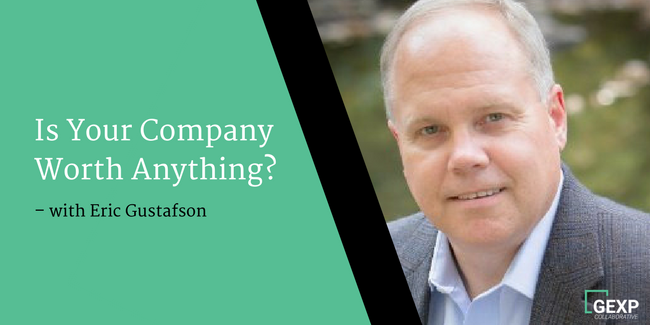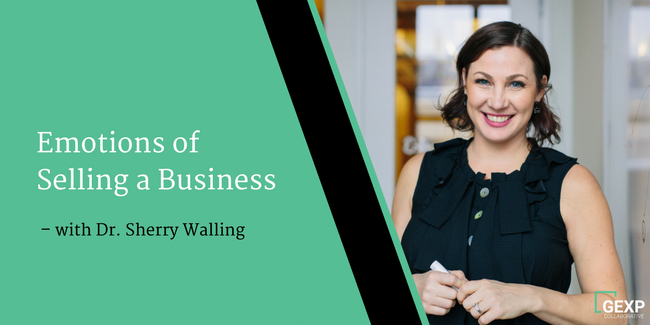Have you ever wondered if you’d regret selling your company once the deal is done? Bobby Martin, who sold his company for 26 million dollars, shares with us his exit journey and what he wishes he’d have done differently. Today, he’s an angel investor at eight companies, a business owner, and an author. If you want a peek at what it’s like to be on the other side of an acquisition and merger, you won’t want to miss today’s episode.
Being an entrepreneur is a highly emotional process. Not only does it require an emotional investment when you first come up with your business concept, but you also need to maintain your passion to drive the value of the business. So what happens when you eventually sell? This podcast with Bobby Martin covers the question of ‘what happens next’ and what you can do to build a valuable business (to someone other than yourself).
Bobby worked as a calling officer for a bank and discovered very quickly just how inefficient their processes were. He recognized that if marketers and sales people, particularly, had access to better quality (and more targeted) information, they could do their jobs more effectively. However, this discovery and his offer to do the market research to provide this information were rejected by the bank.
While that wasn’t ideal, it also pushed him to start his own business. Entrepreneurs often start their businesses due to an unfulfilled need—if they can’t get it from the market, they build a business from which they can. So Bobby started a company called First Research which followed his passion for knowledge and satisfied the market niche he had uncovered.
Finding markets can mean creating your own. Bobby now had a business with which he could do research on other companies and industries and sell to those who needed that information. Sound familiar? Gathering data to improve marketing and sales techniques is a strategy that all serious companies know how to do.
Bobby figured out a fairly novel revenue model for his business. In the late 90s, there weren’t many SaaS (software as a service) companies out there. Bobby took his information service and decided to charge an annual fee which was dependent on the number of people employees at your company. CPA firms, rather than banks, ended up being his preferred customer.
Identifying market needs first in the broad spectrum of the service and then in the implementation of that service (including cost of service) gives you the opportunity to create a competitive edge out of resources you already have. Increasing profitability in this manner is an undervalued skill, but impacts your bottom line in a major way and also provides greater value to your company at time of sale.
The trouble with growing your company becomes how to fund your business so that your ideas, products and services can reach their target market and generate a profit for you. Cutting costs and finding more efficient ways of operating will only take you so far—you need to be closing your sales or else getting an investor. Angel investors are interested in lots of small start-ups which have potential and generally have knowledge in the industry they buy into so they are informed on your business already, therefore they can contribute to meetings, etc.
Bobby is happy in his present role as angel investor and has invested in eight companies and has his own company which he developed after selling First Research. Vertical IQ provides the same services as First Research, essentially, but allowed Bobby to rediscover his passion for the industry while maintaining what mattered to him in his business. The companies Bobby invests in are young and within his purview and scope of interests; therefore, he gets to enjoy the whole process and be part of the team.
As we know, all entrepreneurs will one day exit their business. Whether it’s to sell it or pass it on, the exit will happen. If you’re going to sell your business, Bobby has some words of wisdom for you.
The process is far more emotional than you give it credit. You’ve built your baby and now it’s time to move on. Maybe someone else will be able to grow it better or faster, maybe your companies match each other and can share costs by merging or maybe you simply are ready for the next thing. Either way, you are parting with an integral part of your life and need to respect this process.
Bobby suggests seeing a counsellor who can help you personally and professionally with the exit. Bobby saw a therapist after selling his business because he helped Bobby process everything from the sales process itself to the emotional aspect of no longer running a business.
One thing Bobby found particularly challenging was realizing that when you sell your business, it can have one of three things happen to it. For the first, the business could continue operating in a similar fashion as it is presently; for the second, your company could become a division of another company (say it uses your accounting department, for example); and for the third, your company could become a product and no longer have sales and marketing. He was not prepared for this at all and he found therapy helped him through processing these changes.
His advice is: If you are going to sell in the future, try to sell over a 3-5-year period to the perfect partner and really understand who you are selling to, what their intentions for your business are in terms of integration and culture change. It is absolutely doable… You want to put yourself in a position to have whatever you want in terms of a culture by having a business model that is profitable.
Following that, never get into 50/50 partnerships—maintain majority ownership so you can influence the culture and maintain a business that reflects what you stand for. While money matters, if you want to maintain your vision for the companies you are involved with, you shouldn’t always go for the highest bidder. Having a lot of money and selling out is overrated; having your own company with your own culture and running it the way you want to run it—it treats its employees well, has great margins, has good customer relations—is underrated.
Never forget why you became an entrepreneur in the first place. You should be enjoying what you do more than striving for material goals. Many entrepreneurs become angel investors because they recognize the value of a capital infusion and want to try something new. What comes next for you may not be starting your own business, but rather investing in someone else’s and learning all about that.
So you need to decide what you want your life to look like once you’ve exited your company—this is where a therapist could come in handy to help you sort through your thoughts, feelings and needs in the situation.
The Hockey Stick Principles
Vertical IQ
Finish Big
Small Giants
BobbyMartin.me
Bobby Martin believes that too many startup founders pivot too early, quit too early, and expect rapid takeoff. Through his experience of starting and selling First Research (a leader in sales intelligence) for $26 Million to Fortune 500 firm, Dun & Bradstreet, he’s learned first-hand the challenges and solutions at each stage of entrepreneurial growth. Bobby is the author of The Hockey Stick Principles: The Four Key Stages to Entrepreneurial Success, which was named an 800CEORead Bestseller. Bobby’s current adventure is as chairman and co-founder of Vertical IQ, a leading provider of sales research insight for banks. Bobby is an angel investor and serves as an active board member with several innovative start-ups, including Local Eye Site, Boardroom Insiders, MyLifeSite, Sageworks, and etailinsights. While he is a national speaker, he is still a hometown guy and focuses most of his investments in North Carolina where he has lived and worked.
Before founding First Research with Ingo Winzer in 1998, Bobby spent more than six years with Bank of America as a commercial banker in Wilmington, North Carolina. He graduated with a degree in economics and banking from Appalachian State University. Bobby is married, has two children, and is an avid tennis player.

Dr. Patrick Porter is an entrepreneur, award-winning author, speaker, consultant, and the creator of BrainTap Technologies which uses technology to reformat how the mind...

Eric Gustafson’s story is a great example of how the very best exit planning isn’t really a plan at all – it’s just a...

Today we’ll be talking to Dr. Sherry Walling. A clinical psychologist, Sherry has a ridiculous amount of education and is incredibly smart. She has...